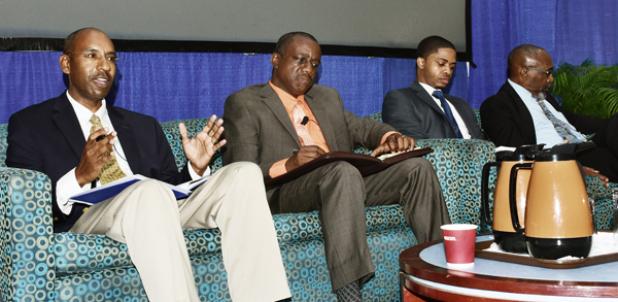
From left: Grenville Phillips II, Leader of Solutions Barbados; Bruce Hennis, Candidate for the United Progressive Party (UPP); Shane Lowe, President of the Barbados Economic Society (BES); and Darcy Boyce, Minister in the Office of the Prime Minister responsible for Energy, Immigration, Telecommunications and Invest Barbados, at the BES and CFA Society of Barbados National Economic Debate yesterday at the Lloyd Erskine Sandiford Centre.
Reduce Fiscal Deficit
Barbados’ major challenges will be to eliminate the fiscal deficit and to reverse the declining trend in foreign exchange reserves.
This was the assessment reiterated by President of the Barbados Economic Society (BES), Shane Lowe, in his opening remarks yesterday at the Barbados National Debate on the Economy, facilitated by the BES and the CFA Society of Barbados at the Lloyd Erskine Sandiford Centre.
He suggested to the incoming administration, “Given the need to boost capital works to enhance physical infrastructure and few sources of financing, a new administration will need to cut current expenditure and/or raise tax revenues more than the existing fiscal gap to sustainably balance the budget and provide enough room to finance necessary infrastructure upgrades. More austerity could further slow growth of the Barbadian economy, unless private sector investment rebounds. Thus, improved conditions for doing business and the courage to facilitate innovation in new and exciting economic sectors are necessary to enable economic recovery.
“Finally, without substantial growth in financial inflows, planned debt service payments will likely further reduce the stock of foreign exchange reserves. One-off inflows may stabilise the reserves in 2018, but likely do not address large debt payments due between 2019 to 2022. Policymakers must secure a cheaper and more sustainable source of foreign financing to stabilise reserves in the medium term, facilitate a sustainable reduction in the fiscal deficit, and restore Barbados’ international credit rating to a more credit-worthy status.”
He recounted the economic landscape that currently exists.
“Over the last year, the Government reduced its fiscal deficit to 4.2 per cent of GDP from 5.7 per cent of GDP in the previous year. That adjustment, while falling short of the desired balanced budget, benefited from greater revenue generated through new and higher taxes, as well as decreased spending on infrastructure. However, greater transfers to public institutions and higher interest costs pushed current expenditures even higher. Further, while higher earnings from tourism increased exports of goods and services, the Government’s austerity programme has constrained demand for imports. Thus, economic activity has declined since June 2017. Of immediate concern are the level and trajectory of our foreign exchange reserves. These reserves – now at $423 million – fell for the fifth consecutive year in 2017 and were 40 per cent lower in March 2018 than they were 12 months prior. For the past three years, foreign private sector investment inflows declined annually, and the country has been repaying maturing foreign debt without sufficient capacity to replace these outflows at favourable interest rates,” Lowe indicated.
“This debate included discussions centred around the following themes: (i) Reversing the downward trend in foreign exchange reserves; (ii) Utilising fiscal policies and exploring alternative industries for accelerating economic growth; and (iii) Minimising the fiscal gap, which includes prioritising and funding our social services. We sincerely hope that all involved benefit from this session, and hope that such a debate becomes a common fixture of our economic and political calendar in years to come,” he added. (NB)
